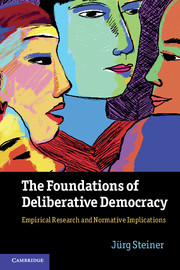Book contents
- Frontmatter
- Contents
- Figures
- Acknowledgments
- Introduction
- 1 Citizen participation in deliberation
- 2 Rationality and stories in deliberative justification
- 3 Common good and self-interest in deliberative justification
- 4 Respect in deliberation
- 5 Public openness of deliberation
- 6 Force of better argument in deliberation
- 7 Truthfulness in deliberation
- 8 Deliberation in the media and the Internet
- 9 Favorable conditions for deliberation
- 10 Favorable consequences of deliberation
- 11 The praxis of deliberation
- Appendix Newest version of Discourse Quality Index (DQI)
- Index
- References
8 - Deliberation in the media and the Internet
Published online by Cambridge University Press: 05 August 2012
- Frontmatter
- Contents
- Figures
- Acknowledgments
- Introduction
- 1 Citizen participation in deliberation
- 2 Rationality and stories in deliberative justification
- 3 Common good and self-interest in deliberative justification
- 4 Respect in deliberation
- 5 Public openness of deliberation
- 6 Force of better argument in deliberation
- 7 Truthfulness in deliberation
- 8 Deliberation in the media and the Internet
- 9 Favorable conditions for deliberation
- 10 Favorable consequences of deliberation
- 11 The praxis of deliberation
- Appendix Newest version of Discourse Quality Index (DQI)
- Index
- References
Summary
Normative controversies in the literature
Jürgen Habermas has always been strongly interested in the media, and as a public intellectual he often intervenes in the media. For him, the media play a crucial role in the deliberative model. He summarizes his position once again in a recent paper entitled “Political Communication in Media Society.” For him, “mediated political communication in the public sphere can facilitate deliberative legitimation processes in complex societies only if self-regarding media systems gain independence from their social environment, and if anonymous audiences grant feedback between an informed elite discourse and a responsive civil society.” Habermas acknowledges the great influence of the media when he writes that “the dynamics of mass communication are driven by the power of the media to select and shape the presentation of messages and by the strategic use of political and social power to influence the agendas as well as the triggering and framing of public issues.” Given this great influence of the media, it is all the more important for Habermas that
first, a self-regulating media system must maintain its independence vis-à-vis its environments while linking political communication in the public sphere with both civil society and the political center; second, an inclusive civil society must empower citizens to participate in and respond to a public discourse that, in turn, must not degenerate into a colonizing mode of communication.
In linking an active citizenship in civil society with the political authorities and doing this in an independent way and in both directions, the media play a great role in the Habermasian deliberative model. “To put it in a nutshell, the deliberative model expects the political public sphere to ensure the formation of a plurality of considered public opinions.” In contrast to most other aspects of the deliberative model, with regard to the media there is hardly any controversy among deliberative theorists. Virtually all stress the importance of the independence of the media and their role in opening mutual channels of communication between the political center and citizens. The concern of deliberative theorists is that the media reality deviates too much from the ideal articulated by Habermas.
Information
- Type
- Chapter
- Information
- The Foundations of Deliberative DemocracyEmpirical Research and Normative Implications, pp. 167 - 182Publisher: Cambridge University PressPrint publication year: 2012
